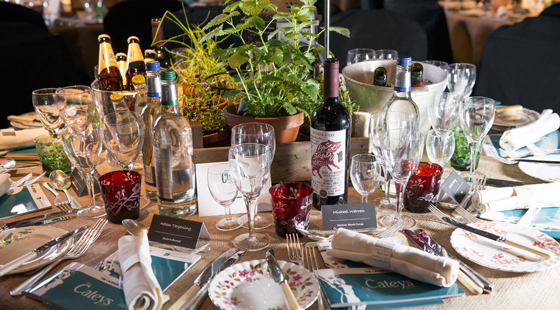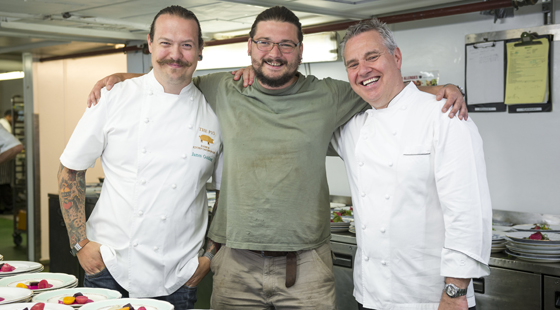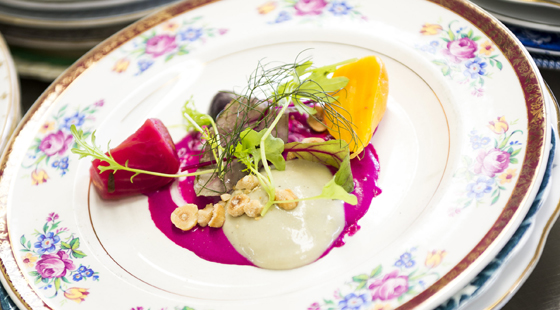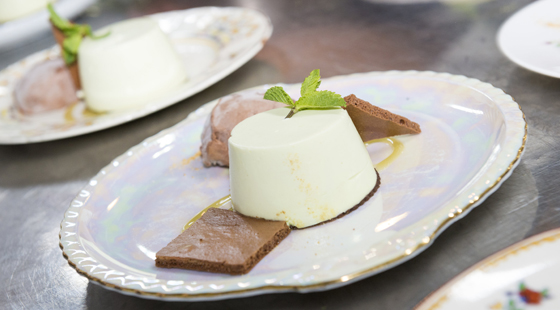Cateys night 2017: The Pig goes to Park Lane
The 2017 Cateys brought the countryside to the capital, courtesy of the Pig group of hotels. Jennifer Sharp discovers how they did it
The Great Room at Grosvenor House, A JW Marriott Hotel, looked superb: majestic proportions, sumptuous chandeliers, magnificent curving staircases and a backdrop of twinkling stars against a midnight-blue sky.
But what's this on the tables? Instead of the sleek five-star glamour the guests expected, there were rough hessian cloths, wooden boxes and flowerpots with an unruly profusion of wild leaves and herbs. Simple garden lanterns held chunky candles and mismatched floral plates were paired with vintage cutlery with bone handles. What was going on, people whispered, but then Robin Hutson started to speak and they understood. The Pig had come to Park Lane.
Chairman and chief executive Hutson explains his reaction when Amanda Afiya, â¨editor of The Caterer, first approached him last October. âI thought it was a real curve ball â" â¨perhaps even a poisoned chalice,â he says. âWeâve seen a succession of âgod-like chefsâ, such as Simon Rogan, Tom Kerridge and Mark Sargeant at the Cateys, a real whoâs who of the food world. I needed time to think about it. But 24 hours later, I thought âwhy wouldnât we do it?â It was an incredible opportunity for the team.â
As well as devising the menu, the Pig â¨would provide much of the produce and decorate the tables in its own unique style. It was a hugely ambitious project that took many months to realise.
To bring the Pigâs world into focus, on the night of the Cateys the audience watched a short film showing the six months of intensive work needed in the kitchen gardens to provide dinner for 1,250 people on 4 July. Home Grown Hotelsâ top team â" chef-director James Golding, Alexa Bartlett-Woodnutt, group pastry development and kitchen co-ordinator, and senior kitchen gardener Ollie Hutson, whose enthusiasm and horticultural knowledge is â¨as inspiring as his father Robinâs vision for the hotel â" was excited by the challenge.
ââFrom seed to plateâ is crucial to who we are, and what we canât grow ourselves, we source from within 25 miles,â says Robin. âWe actively avoid ingredients that are not local.â Golding is on first-name terms with his suppliers of meat (the pigs live a happy life in the hotel grounds) and local butcher Alan Bartlett interprets Goldingâs recipes â¨for mouthwatering charcuterie. Thereâs local honey and fresh bread, artisan butter and cheese and fresh fish. â¨A trusted forager combs field and forest for unusual items and the Pig produces new-laid â¨eggs, mushrooms, smoked salmon and a wide range of preserves, pickles, vinegars and â¨fermentations. It sounds old-fashioned, but itâs right on the button with todayâs trends.
The kitchen garden is an essential part of every Pig hotel, and guests love to visit them and discuss produce and recipes with the â¨gardeners. Glasshouses hold heavy trusses of tomatoes, melons and many varieties of peppers and herbs. Fruit cages keep strawberries, blueberries, black, red and white currants away from hungry birds, while lavender, root vegetables and hardy herbs occupy sunny open beds in the walled garden. The garden not only supplies the hotel kitchen, it provides herbs for the bar, such as tangerine sage, lemon balm and kaffir lime leaves. Thereâs an unusual rosemary with a strong ginger flavour, and an inconspicuous flower called an electric daisy that create an instant numbness in the mouth. The kitchen garden isnât just charming set dressing, itâs beautiful and hardworking â" a crucial part of the companyâs DNA and its success.
So how would this cosy niche style translate into the stately and luxurious ocean liner that is Grosvenor House? Executive chef Nigel Boschetti, in charge of a huge kitchen operation, had no doubts. âThe menu wasnât as complex or experimental as Simon Roganâs last year, but the logistics were challenging. We loved working with the Pig. It was more than just a menu â" it was a culture. Weâve never had a collaboration where our partners are 100% involved.â
In the days leading up to the Cateys, a â¨network of vans crisscrossed the country, picking up from Ollieâs kitchen gardens and delivering to Park Lane. There were 200kg of broad beans and 146kg of beetroot, as well as salads and herbs for the final dressing of the dishes.
The printed menu echoed the Pigâs own style, starting with Piggy Bits: delicious appetisers of bitesize sausage rolls with black pudding, and mustardy mouthfuls of ham hock and quailsâ eggs. The Literally Picked This Morning starter used four varieties of beetroot, toasted hazelnuts and â¨a perky raspberry vinegar, while the Piggy Fours that rounded off the meal used home-grown lavender and rhubarb.
Only the main course had to be modified for the numbers and cascade service. Golding wouldnât normally choose lamb in high â¨summer, but the braising process suited the logistics of the evening.
A boned-out leg, stuffed with rosemary and garlic, was rolled and braised in advance so that neat portions could be refreshed and plated at the last minute. It worked well, with the glossy sauce â¨perfectly balanced by vegetables and herbs. Only 20 out of 1,250 guests requested the â¨vegetarian main course: a âhome grownâ oyster and shiitake mushroom and spinach parcel, garden vegetables and watercress sauce.

There is clearly a lot of mutual respect between the Pig and Grosvenor House. âI canât think of a better person to have worked with than Nigel Boschetti,â says Golding.
On the night, everything worked perfectly, despite a brief heart-stopping moment when the whipped Blue Vinney cheese for the starter started to melt in the heat of the kitchen. But Boschettiâs 22 chefs rose to the occasion. Even âthe crazy numbersâ didnât deter the nine chefs from the Pig who worked alongside them.
As the wine flowed, the buzz in the room increased to fever pitch in anticipation of the awards, but there was an important announcement on behalf of this yearâs appeal Adopt a School. The charity works with seven- to 10-year-olds to help them understand and enjoy food and cooking (and hopefully encourage them into a career in â¨hospitality). Itâs a subject important to the Pigâs Golding and some of the greatest chefs around, such as Raymond Blanc â" both chef ambassadors for the charity.
The audience heard an impassioned address from John Williams who, apart from leading the kitchen team at the Ritz hotel, is executive chairman of the Royal Academy of Culinary Arts and also a trustee of the academyâs Adopt a School programme. Williams, who later that night collected the Special Award Catey, quoted a chilling statistic that while the charity reaches 15,000 children a year, 30% of those kids have never sat at a table for a meal or used a knife and fork. The charity sends professional chefs into schools to inspire children with cleverly devised programmes that are both instructive and fun.
Williams was joined on stage by Sara Jayne Stanes, chief executive of the Royal Academy of Culinary Arts, who was equally convincing about Adopt a School, thanking the many high-profile chefs who take part in it, and â¨urging the audience to be generous.
Golding â" who, with his tattoos, piercings and long hair, is as cool as any East London chef â" has two young children and a comfortable empathy with the kids he meets through Adopt a School. Heâs lucky in coming from a family with a deep love of food and cooking; not just his Italian mother but also his businessman father, who took evening courses so heâd understand the career his son had chosen.
Golding described classes of up to 30 young kids learning about taste and texture, discovering how to cook simple dishes, like pasta or salads, how to use knives and kitchen equipment, and how to recognise unfamiliar ingredients such as celeriac. Thereâs often a mobile garden with a crate of vegetables and pots of soil with living plants. Itâs utterly inspirational.
This yearâs collaboration with the Pig has been a triumph. Home produce and visual appeal along with a cracking meal gave an extra dimension that no one was expecting. Many guests said it was the best Cateys they had attended.
The dinersâ view
Will Smith, owner, Sugar Boat, Helensburgh
âThe Cateysâ partnership was thought-provoking and inventive. It was an interesting and creative change from what you might have expected. The tables looked stunning â" an impressive achievement to create this feel en masse â" and truly conjured the feel of a Pig dining room. I loved the food and style of presentation. It hit the zeitgeist perfectly â" modern, natural-looking plates of food packed full of flavour. And what a treat to be poured â¨an English wine.â
Elizabeth Carter, consultant editor, Good Food Guide
âI love the way the Pig hotel group grows its own food. For me, the gold medal in this farm-to-table pop-up goes to the pre-meal introduction â" Iâm booking into a Pig hotel at the earliest opportunity. Running a close second, the stunning green-themed table settings and beetroot starter â" light, colourful and easy to like.â
Paul Adams, owner, â¨the Vincent, Southport
âOn walking into the Great Room, I was expecting the standard function-room layout with white linen, candles and shiny silverware. But I was pleasantly surprised to see the tables decorated with a beautiful outdoors feel. What particularly stood out on the hessian table cloth were my mumâs crockery side plates and ivory-handled butter knives; all it needed was a scone, some jam and cream for me to feel completely at home.â
Maureen Mills, founder, Network London
âThe food looked beautiful and was delicious, especially the sauce on the lamb main course. I could happily have devoured a whole jug of it â¨and licked my plate clean.â
The Pig and Matthew Clark
Just like the creation of the food menu â¨and its home-grown ingredients, Robin Hutson planted the seed for the wine selection with Matthew Clark in late 2016. Our aim was clear: to bring an authentic â¨taste of the Pig to the Cateys for a one-â¨night-only pop up for 1,250 guests.
A key criteria was to serve credible â¨British drinks, and this extended not onlyâ¨to the fruit of the vine but also to small-scale spirit producers. The Pig pours the excellent hand-crafted vodka and gin from William Chase, so we were keen to feature these â¨in some simple seasonal cocktails that â¨also showcased the quirky tonics of the London Essence Company.
For the wines I looked to our growing English range, and I found an ideal partner â¨in the food-friendly Chapel Down in Tenterden, Kent. An early menu tasting â¨in March led me towards the Sauvignon Blanc-like flavours of the Bacchus grape â¨and the challenge then was to secure the quantity required for such a large event.
Without wanting to sound crass, global warming has helped the English wine industry to produce better quality wines, â¨but on the whole, this country remains too cool to ripen grapes for the production of full-bodied reds â" and this is the style I was looking for to match the lamb dish. I therefore looked to continental Europe, and a new wine from Sardinia that had caught my eye and palate at our annual March tasting. Our buyer had come across it when visiting one of our suppliers and their Passo Sardo Rosso shone for its quality and value.
Finally, Iâm always keen to put a glass â¨of dessert wine in the Catey guestsâ hands â" â¨it remains a great opportunity for up-selling. The Pigâs signature mint mousse is at once delicate and punchy, and many of the dessert wines we tried with it were simply too luscious, too dominant. However, I found an exciting match on a visit to Piedmonte at a tasting put on by the historic Gancia winery: the combination of lightness and sweet fruit intensity of their traditional method Asti Cuvée 24 Mesi worked perfectly.
Nick Zalinski, business director, â¨Matthew Clark
Videos from The Caterer archives




















